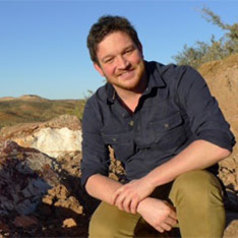Ben’s main areas of interest are in primatology, evolutionary studies and skeletal morphology. He studied BSc (Hons) Animal Behaviour at Anglia Ruskin (2002-05) and his PhD, titled “Primates of the Caribbean” focused on monkey evolution on tropical islands. In addition to his role as Professor of Evolutionary Biology and Science Engagement at the University of East Anglia, Ben has presented a number of television programmes, including a documentary with Sir David Attenborough and his own six-part BBC Four series Secrets of Bones.
Background
Throughout the last decade Ben has lived and worked all over the world, mainly within great ape conservation; spending several years in central Africa, managing a renowned chimpanzee conservation field site and habituating wild chimps. He has also worked extensively across South East Asia, China, the Caribbean and the Arctic for a range of organisations, in differing habitats and with numerous species.
Ben is an accomplished public speaker and has spoken at a range of conferences, science festivals, including the Cheltenham Science Festival and taken part in public debates. Ben was offered the opportunity to present his own six-part BBC Four series Secrets of Bones, which won the Wildscreen Panda Award for Best Presenter Led programme in 2014. Since then he has presented a number of science documentaries, including Red Ape, Hyper Evolution: Rise of the Robots, the Day the Dinosaurs Died and presented alongside Sir David Attenborough on the BBC One documentary Attenborough and the Giant Dinosaur.
Ben’s main academic focus in on primatology, evolutionary studies and skeletal morphology. Island systems have provided fundamental insights into evolutionary patterns and processes from Charles Darwin onwards, notably through comparison of morphological character differences between insular lineages and mainland sister groups. Evolution of unique characters in island species may be driven either by founder effects associated with population bottlenecks during colonisation, or by active adaptation in response to rapid environmental change associated with colonisation and/or the unusual ecological environment on islands.
Research interests:
Primatology
Evolutionary Biology
Skeletal Morphology
Science Engagement
Experience
-
2019–presentProfessor of Evolutionary Biology and Science Engagement, University of East Anglia
-
2010–2018Fellow, Animal & Environmental Biology, Anglia Ruskin University
- Bristol, UK
- @Ben_garrod
- Article Feed
- Joined


